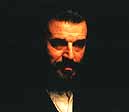
The Dutch have a restless obsession with the Second
World War and, as a result, it is the source for much of
the subject matter found in their films. So, here we are
Left Luggage
© Shooting Star Filmcompany BV
© MVSP Publicity/Promotion/Public Relations

|
|

|
once again with it taking a different shape and packed
this time into the form of "Left Luggage". Dutch actor
Jeroen Krabbe, who has gained international acclaim
through such vehicles as the TV series "Dynasty" and
numerous films including "No Mercy", "Jumpin' Jack
Flash", "The Living Daylights" and "The Prince of
Tides", has turned his hand this time to a double role:
lead actor and director. His formidable contacts
stretching throughout the film world have been of
assistance in lining up an impressive international cast
for this Dutch film, which boasts Isabella Rossellini,
Maximilian Schell, Topol, Marianne Sagebrecht, Miriam
Margolyes and, of course, Krabbe himself. The film
has, shortly after its world premiere at the Berlin Film
Festival, received the award for Best Film by a Debut
Director.
Chaja, a student in her twenties, is finally fed up with
the cockroaches breeding between the dishes in the
kitchen sink, and so decides to leave her revolution
preaching boyfriend, Peter (Antonie Kamerling), and
make a clean start of it on her own. Chaja's mother is
constantly offended by the fact that her daughter visits
her parents so infrequently. Chaja's father (Maximilian
Schell), on the other hand, is preoccupied with two
buried suitcases of memorabilia that he hid beneath the
earth of his front garden many years ago (during the
war) when evading the invading Germans. Now he
spends his time in an attempt to figure out exactly
where that piece of land is, as transfixed within today's
landscape of Antwerp, in order to locate them once
again and dig them up. Chaja (Laura Fraser) doesn't
understand his fixation with these suitcases or his
lifelong nostalgia concerning them. This family's
worldly wise neighbor Mr. Apfelschnitt (Topol),
understanding that there is a world of difference
between the generations (generations of difference, to
be exact), tells Chaja of a potential job opening with a
Chassidic family which might be suitable for her as
baby-sitter for four children. Although she doesn't
particularly like the idea of working in the Chassidic
milieu, she needs to pay the rent in order to pacify her
landlady. And so Chaja enters the old world.
Mrs. Kalman (Isabella Rossellini), who would prefer a
Chassidic baby-sitter, becomes immediately aware of
the special contact between Chaja and her boy, Simcha
(Adam Monty) and considers her to be a potentially
positive influence on this problem child, who won't talk
and is continually wetting himself. It is, in fact, because
of Simcha that Chaja finally decides to accept the job.
Mr. Kalman (Jeroen Krabbe) on the other hand, thinks
the girl is like a harlot, dressing the way she does and
not knowing her place as a woman; after all, he is
Chassidic. The number of unexpected rules
confronting Chaja become almost unbearable.
Nevertheless, under her influence, Simcha, while not
yet talking, begins to quack like the ducks. His father,
of course, doesn't like this at all because he considers
it to be an offense. The confrontation between their
different worlds and varying points of view continues.
The Passover Seder, to which Chaja has been invited,
and for which she and Simcha have prepared a special
surprise, brings even bigger problems along with it.
The film attempts to present a portrait of belief systems
and life values, both religious and social, that are often
at variance with and frequently in opposition to one
another, but doesn't succeed in clarifying these points
in any satisfactory way. The necessary counterpoint of
the tale, which perhaps was meant to be embodied in
the person of Simcha, is lacking and, although the film
constantly gives the impression of heading toward
some final destination, a resolution is never reached.
Scriptwriter Edwin De Vries, who adapted the original
novel The Shovel and The Loom by Carl Friedman,
says, "It was only after I had seen the edited version of
"Left Luggage" that I realized the story was a metaphor.
The film is about life, the thoughts and the growth of a
generation born after the Second World War."
Although there are poignant moments in the film, the
absence of a binding element makes it seem
sometimes unendurably long.
Art director Hemmo Sportel's choice of locations and
set decorations have succeeded admirably in creating
a completely realistic atmosphere of Flemish
households and living quarters in the 70's. The crew
assembled for the production is top notch. In a number
of seams and stitches, however, it reveals that it is,
above all, a creation with an actor at the helm (and at
its heart). Announcing the appearance, for example, of
Topol (noticeably included in the credits as Chaim
Topol) we see the actor approaching from the
background (a la Lawrence of Arabia) until he becomes
part of the scene. The apprehension created by
delaying the first appearance of director/star Krabbe in
the role of Mr. Kalman is another such moment which,
due to such delay, has increased impact solely created
by the late entrance and camera angle (no face).
Among the established stars, only Rossellini seems to
have been left behind in the list of "entrance &
appearance" effects, but she is more than
compensated with her "special moment" near the end
of the film which remains unquestionably the most
emotional moment in the tale. The structure of the
whole, in fitting with this method of approach, also
leans more toward theatrical effect than filmic effect.
I believe Chaim Topol's remark upon the film is the
most telling: He says, "We put ingredients in the oven
and we hope that a good cake is coming out. The
question whether it has universal appeal, if it is
appealing to people from all kind of nationalities. We
never know upfront."
© 1994-2006 The Green Hartnett
|

